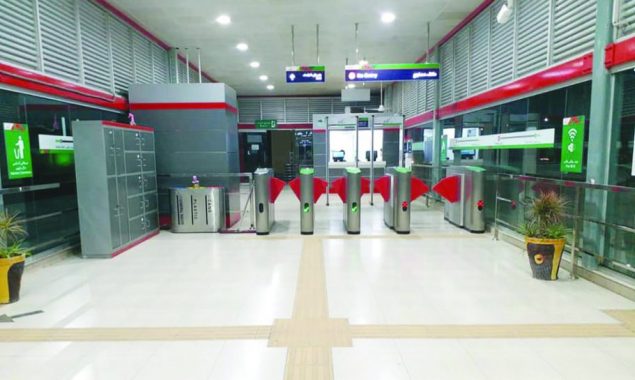
Gone are the days when people used to run after wagons to occupy a seat for University of Peshawar (UoP), Hayatabad and vice-versa to the general bus stand as it was the only option to reach the respective destination within the provincial capital in shortest possible time.
However, thanks to the introduction of the Zu Peshawar Bus Rapid Transport (BRT) service, the Khyber Pakhtunkhwa capital’s commuters have breathed a sigh of relief.
The people, especially students and academicians, used to wait for hours at UoP and Islamia College Peshawar’s (ICP) bus stops to get a seat in a wagon and often walk two to three kilometres to nearby stop of Board of Intermediate and Secondary Education (BISE) to get wagon service instead of buses that usually take very long time to reach Firdaus, Hastnagri, Faqirabad, Gulbahar, Warsak and Charsadda Roads and finally to the general bus stand for onward travelling to the downward districts.
Women, children, senior citizens and persons with disabilities could hardly avail the service due to rush at bus and wagon stands and limited seats in the wagons, which were mostly occupied by men. As a result, the mental agony of people used to increase manifold during harsh weather conditions and rain.
“I can’t forget the pain of waiting for hours at UoP’s bus stop to get a seat in a wagon and often had to go up to BISE’s stop by covering almost two kilometres distance on foot to grab a seat due to heavy rush of passengers at the university and ICP stops,” Khurshid Alam, a former UoP student recalled while talking to APP.
“In case of heavy rain or chilly weather conditions in winter, passengers had to travel in buses or wagons shivering in cold,” said Mr Alam.
“It took me two hours to reach the university from general bus stand while travelling on wagon. Now the same distance is being covered in less than 30 minutes while travelling through state-of-the-art BRT service, which is a great blessing for people of Peshawar,” he said.
Enter Zu
While terming the BRT as the country’s first third-generation highly successful project of the PTI government, Mohammad Umair Khan, spokesman of BRT, told APP that the number of passengers had significantly increased in BRT with easing of the pressure of coronavirus. Over 220,000 passengers use the service on a daily basis, he added.
Despite severe pressure of coronavirus in early months of 2021, he said, over 50 million passengers have travelled in BRT this year, which was a matter of great pride.
“Since inauguration of the BRT service by Prime Minister Imran Khan on August 13, 2020 at Peshawar, over 60 million passengers have benefited from BRT service till date despite Covid-19 lockdowns and travels restrictions.
“Before BRT, the travelling ratio of women in Peshawar was less than two per cent and now it has increased to above 20pc with the start of this quality service which has reserved seats for persons with disabilities, females and even for transgender to ensure travelling facilities for all”, the spokesman said.
The BRT has a 27.5km-long main corridor track starting from Chamkani to Karkhano Market with 31 stations, besides many feeder routes of total 62km.
He said the popularity of the service could be judged from the fact that over one million ZU cards have been distributed so far among people and 30 new buses were included in BRT’s fleet to provide comfortable and quick signal-free travelling facilities to passengers increasing with each passing day.
Mr Umair said that currently 220 buses were part of the BRT fleet out of which 158 were fully operational. He said buses were being increased keeping in view of pressing load of passengers.
The spokesman said 349 old and dilapidated public transport buses and wagons were scrapped and payment was made to their owners, adding that the move was aimed to control air pollution and address the issue of traffic jams in Peshawar.
Bike sharing
The BRT’s main express routes have been increased and the unique ZU Bicycle Sharing System was launched under which 360 modern ZU bicycles were distributed among residents of Peshawar, students and passengers, he said.
Similarly, 32 docking stations were established and a latest ZU mobile application was launched for facilitation of passengers. Under Clean and Green Vision of prime minister of Pakistan, he said that 3,000 trees were planted by the BRT’s administration in Peshawar to combat air pollution.
Extension planned
Managing director KP Urban Mobility Authority (KP UMA) Bahramand Khan told APP that keeping in view the success of the BRT, the KP government has planned to extend the service to Khyber and Warsak Roads through construction of new feeder routes to facilitate its residents and government employees under BRT Phase-II.
He said linking traffic jams with BRT was unjustified. He said traffic jams were also being witnessed in Kohat and Dalazak Roads from time to time due to increase in number of vehicles despite the fact that the service was not available there. He said about 12,000 complaints were received and prompt action was taken for their solution, adding that zero tolerance was adopted against harassment or violence in BRT.
To increase revenue and awareness among the public, he said different portions of the service were being used for publicity to strengthen BRT and 90 digital screens were installed for dissemination of messages.
Read More News On
Catch all the Peshawar News, Breaking News Event and Latest News Updates on The BOL News
Download The BOL News App to get the Daily News Update & Follow us on Google News.




